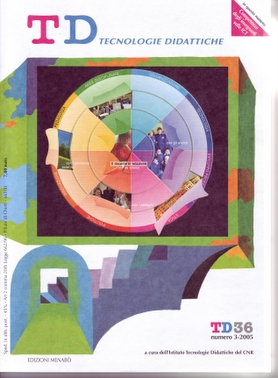Le aree di competenza di un insegnante nella società della conoscenza
Contenuto principale dell'articolo
Abstract
Dettagli dell'articolo
Sezione
Gli autori che pubblicano su questa rivista accettano le seguenti condizioni:
- Gli autori mantengono i diritti sulla loro opera e cedono alla rivista il diritto di prima pubblicazione dell'opera, contemporaneamente licenziata sotto una Licenza Creative Commons CC BY 4.0 Attribution 4.0 International License.
- Gli autori possono aderire ad altri accordi di licenza non esclusiva per la distribuzione della versione dell'opera pubblicata (es. depositarla in un archivio istituzionale o pubblicarla in una monografia), a patto di indicare che la prima pubblicazione è avvenuta su questa rivista.
- Gli autori possono diffondere la loro opera online (es. in repository istituzionali o nel loro sito web) prima e durante il processo di submission, poiché può portare a scambi produttivi e aumentare le citazioni dell'opera pubblicata (Vedi The effect of Open Access).
Riferimenti bibliografici
Banzato M., (2006), Competenze sulle ICT degli insegnanti nella società dell’informazione, TD, Tecnologie Didattiche, n.36, Menabò, Ortona (questo numero).
Cox M., Webb M., Abbott C., Blakeley B., Beauchamp T., and Rhodes V. (2003), ICT and Pedagogy, A Review of the Research Literature, in ICT in Schools Research and Evaluation Series, No. 18, Becta/DfES, Coventry/ London.
European Commission, DG Education and Culture (2004), Study on Innovative Learning Environments in School Education, Ramboll Management, Final Report September 2004.
Fullan M. (2004), Learning to Lead Change: Building System Capacity, OISE / Microsoft, Toronto.
Hargreaves D. (2003), Education Epidemic: Transforming secondary schools through innovation networks, DEMOS, London.
Holmberg C. (2002), Flexible Learning - Challenges for teachers, schools and authorities, Proceedings of EMINENT conference, Stockholm 21-22 November 2002.
Kozma R., McGhee R. (2003), ICT and innovative classroom practices, in Kozma R. (Ed.), Technology, innovation, and educational change: A global perspective, Eugene, OR: International Society for Educational Technology.
Martin A., Repetto M., (2005), Teacher’s values and attributes within a knowledge society in Midoro V. (ed) (2005), A Common European Framework for Teachers’ professional profile in ICT for Education, Menabò, Ortona, pp.23-27.
Martin A. (2005), DigEuLit – a European Framework for Digital Literacy, Journal of eLiteracy, Vol 2 (2005)
Midoro V. (ed) (2005), A Common European Framework for Teachers’ professional profile in ICT for Education, Menabò, Ortona.
Midoro V., (2006), Competenze sulle ICT degli insegnanti nella società dell’informazione, TD - Tecnologie Didattiche, n.36, Menabò, Ortona (questo numero).
Martin C. D., Martin, D. H. (1990), Professional codes of conduct and computer ethics education, ACM SIGSAC Review, Vol. 8, issue 3, p. 1-12.
OECD (2004), Completing the foundation for lifelong learning. An OECD survey of upper secondary schools, OECD Publications, Paris.
UNESCO (2003), Building Capacity of Teachers/ Facilitators in Technology-Pedagogy Integration for Improved Teaching and Learning, Experts’ Meeting on Teachers/Facilitators Training in Technology-Pedagogy Integration, 18-20 June 2003, Bangkok, Thailand.

